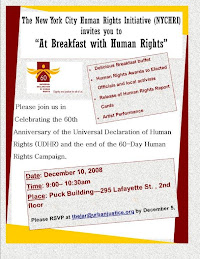Organized by the United Nations, the Durban Review Conference and the process of preparations leading up to it provide an opportunity to assess and accelerate progress on implementation of measures adopted at the 2001 World Conference against Racism, including assessment of contemporary forms of racism, racial discrimination, xenophobia and related intolerance.
The 2001 World Conference against Racism, Racial Discrimination, Xenophobia and Related Intolerance (WCAR), held in Durban, South Africa, was a landmark event in the struggle to improve the lives of millions of human beings around the world who are victims of racial discrimination and intolerance. After a wide-ranging debate, the Conference adopted by consensus the ground-breaking Durban Declaration and Programme of Action (DDPA), which provided an important new framework for guiding governments, non-governmental organizations and other institutions in their efforts to combat racism, racial discrimination, xenophobia and related intolerance.
The DDPA is the most comprehensive and valuable framework that exists for addressing these extremely important issues. It encompasses far-reaching measures to combat racism in all its manifestations, including strengthening education, fighting poverty, securing development, improving the remedies and resources available to victims of racism, and bolstering respect for the rule of law and for human rights.
While progress has been made since 2001, there is a continued need for committed implementation of the DDPA. Racist attitudes and hate speech can be found in many countries and technologies such as the Internet provide new vehicles for their proliferation.
The decision to convene the Durban Review Conference was made by UN Member States at a General Assembly meeting in 2006 (Resolution A/RES/61/149). The General Assembly requested the UN Human Rights Council to prepare the process and the Human Rights Council therefore constituted a Preparatory Committee of the Conference. The work of the PrepCom is open to all UN Member States, beyond the 47 members of the Human Rights Council. The UN High Commissioner for Human Rights was appointed by the UN Secretary-General to serve as Secretary-General of the Conference and her Office (OHCHR) functions as its Secretariat.
Monday, March 23, 2009
Subscribe to:
Posts (Atom)



